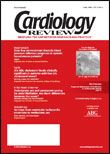Publication
Article
Cardiology Review® Online
Can C-reactive protein levels predict risk of hypertension in a younger population?
Is hypertension an inflammatory disease?
Is hypertension an inflammatory disease? A logical approach to answering this question would be to assay inflammatory mediators in the normotensive population and observe whether their levels are predictive of future development of hypertension. Measurement of C-reactive protein (CRP), a surrogate for inflammation, serves that purpose. In the Coronary Artery Risk Development in Young Adults (CARDIA) study, investigators measured CRP concentrations and observed their relationship to future development of hypertension. The result: no relationship.
Then is the hypothesis dead or not? It is hard to say because other studies have reported that there is a relationship.1,2 Interestingly, those studies looked at middle-aged populations, whereas this study looked at a younger population. An explanation suggested by the discrepant findings between younger and older individuals is that hypertension might be a different disease in younger versus older people. In younger people, hypertension might be linked more to genetic determinants of, for example, hormone levels (eg, aldosterone) or renal sodium handling, rather than to arterial inflammation and disease. In contrast, in older individuals who did not develop hypertension prior to middle age, hypertension might be linked more to degenerative/inflammatory arterial disease, associated with age and cardiovascular risk factors, and lead to endothelial dysfunction and arterial stiffness. Elevated CRP in itself may contribute to inflammatory changes and may also serve as a surrogate for inflammatory cytokines, thus serving, to some extent, as a marker of arterial disease evident well before the systolic pressure reaches the 140-mm Hg threshold. This would suggest that arterial inflammation predates and predisposes to hypertension in older patients.
Although an elevated CRP level is predictive of cardiovascular disease and possibly of hypertension in older populations, it is also clear that traditional risk factors are much more important predictors. Even in the studies in which CRP elevation predicted the development of hypertension, body mass index and the presence of “prehypertension” (systolic blood pressure of 120-139 mm Hg) were much more powerful predictors.
Given the results of this and previous studies, it is hard to see a clinical place for CRP measurement as a predictor of hypertension. Its predictive value is low, and there is great overlap in CRP values between those who do and do not go on to develop hypertension. Also, most who do develop hypertension have a CRP value in the normal range. Interpretation is also hampered by the variability inherent in CRP measurement because of factors such as intraindividual variability, interassay variability, and other factors, such as intercurrent inflammatory conditions and even periodontitis. The higher CRP values in women also demand that sex be considered.
Although a high CRP concentration is associated with certain adverse cardiovascular outcomes, it is the traditional risk factors for cardiovascular disease or hypertension that still take center stage. The CRP level does tweak the risk up or down, but it is not a major predictor of hypertension, and in young people, as this study indicates, it is not an independent predictor at all. However, the data from other studies do support the theory that arterial inflammation is a predecessor of hypertension in older individuals.






